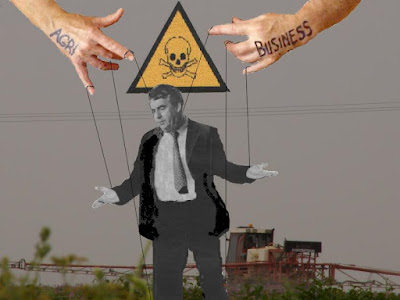
to feed our gas-guzzling cars?
Governments and corporate bodies present agro-fuels as the panacea for the problems of a post peak oil era.
Their bold assertions are myths.
(text in colour are quotes from an article of Eric Holt-Gimenez, Ph.D.Executive Director,Food First/Institute for Food and Development Policy)
It is now acknowledged by the scientific community that biofuels are not the magic bullet to the problem of either carbon emmissions or the transition from peak oil to a renewable fuel economy. The industrialized countries are aggressively promoting an agro-fuels boom, through mandating renewable fuel targets. However, these targets far exceed the agricultural capacities of the Industrial North. Consequently Northern countries expect the Global South to meet their fuel needs, and most Southern governments seem happy to oblige. Indonesia and Malaysia are rapidly cutting down forests to expand palm-oil plantations targeted to supply up to 20% of the EU bio-diesel market. In Brazil-where bio-fuel crops already occupy an area the size of Netherlands, Belgium, Luxembourg and Great Britain combined-the government is planning a five-fold increase in sugar cane acreage with a goal of replacing 10% of the worlds gasoline by 2025.
In Columbia, land-grabbing from local peasants as well as from indigenous and minority groups. Should anyone resist they or members of their family might be made to disappear, by paramilitaries.
For more information on Columbia -see September issue of 'Ecologist' September 2007.
MYTHS-
Myth 1- Agro fuels are clean and green.
Myth 2- Agro-fuels will not result in deforestation.
Myth 3- Agro-fuels will bring rural development.
Myth 4- Agro-fuels will not cause hunger.
Myth 5- Better "second-generation" agro-fuels are just around the corner.
(from foodfirst.org).










